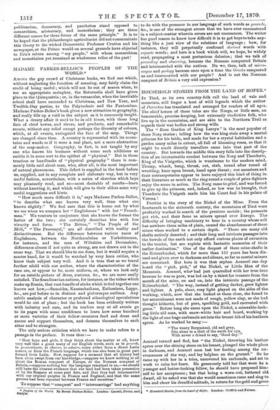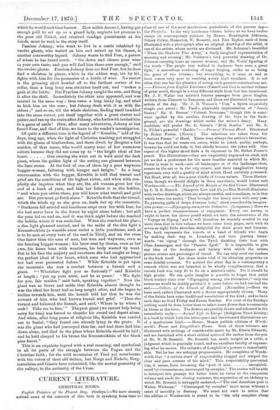HOUSEHOLD STORIES FROM THE LAND OF HOFER.* -
Ix Tirol, as its own country-folk call the land of vale and, mountain, still linger a host of wild legends which the author of Patranas has translated and arranged for readers of all ages.. The chief heroes of these tales are the Norgs, or little men, an honourable, promise-keeping, but extremely vindictive folk, who live up in the mountains, and are akin to the Northern Troll as regards their wee bodies and strong wills.
The " Rose Garden of King Lareyn " is the most popular of these Norg stories ; telling how the wee king stole away a mortal, princess for his bride, and made for her a crystal habitation and a garden many miles in extent, all full of blooming roses, so that it might be smelt directly travellers came into that part of the country. But towards the middle this story falls into the descrip- tion of an interminable combat between the Norg and Theodoric, King of the Visigoths, which is wearisome to the modern mind.. Thump, whack, bang, thrust, cut, stab, round after round of wrestling, knee upon breast, hand upon throat ; our ancestors and. their contemporaries appear to have enjoyed this kind of thing in their literature as much as the ring round a couple of prize-fighters. enjoy the scene in action. The Norg came to grief, and was forced_ to give up the princess, and, indeed, so low was he brought, that Theodoric the Visigoth made him his Court fool in his palace of Verona !
Prettier is the story of the Nickel of the Mine. From the fourteenth to the sixteenth century, the mountains of Tirol were- profitably worked in search of the precious metals ; the peasants. got rich, and their fame as miners spread over Europe. The- difficulty of bringing machinery to bear in a country whose soil has nowhere three miles of plain, caused the abandonment of these: mines when worked to a certain depth. " There are many old. shafts entirely deserted ; and their long and intricate passages into the bowels of the earth not only afford curious places of excursion_ to the tourist, but are replete with fantastic memories of their earlier destination." One of the deepest of these mine-shafts is. the Rohrerbiichel, which, for more than 150 years has been dis- used and given over to darkness and silence, so far as mortal miners are concerned. But here it was that orphan Aennerl one day heard the " pick, pick," of the Nickel, or Little Man of the. Mountain. Aennerl, who* had just quarrelled with her true-love: because he was so poor, was led on by a thirst for treasure from the. mouth of the mine, on and on, into the intricate passage of the- Riihrerbiichel. " The way, instead of getting darker, grew lighter and lighter. A pale, clear, rosy light played on the sides of the. working, which, now that she looked at them close, she found to her astonishment were not made of rough, yellow clay, as she had, thought hitherto, but of pure, sparkling gold, and encrusted with. gems." Before long she came upon the Nickel, a miserable-look- ing little old man, with snow-white hair and beard, working by the light of one huge carbuncle set into the breast-bib of his leathern. apron. As he worked he sang :— " The weary Bergminnl, old and grey,
Sits alone in a cleft of the earth for aye, With never a friend to say, 'Good day.' "
Aennerl turned and fled, but " the Nickel, throwing his leathern apron over the shining stone on his breast, plunged the whole place in darkness, and Aennerl soon lost her footing among the un- evennesses of the way, and lay helpless on the ground." So he. came up with her in a trice, uncovered his carbuncle, and set to work to calm her fears. He generously told her that were he a, younger and better-looking fellow, he should have proposed him- self to her acceptance ; but that being a worn-out, battered old, dwarf, all he asked was that she would sometimes come and sing to him and cheer his dreadful solitude, in return for the gold and gems.
• Household Stories from the Land of Hofer. London: Griffith and Ferran..
which he would each time bestow. How selfish Aenneil, having got enough gold to set up as a grand lady, neglects her promise to the poor old Nickel, and received condign punishment at his Lands, must be read in the story itself.
Fearless Johnny, who went to live in a castle inhabited by twelve ghosts, who waited on him and served up his dinner, is another noteworthy legend. Johnny wants to find Fear, a person of whom he has heard much. " Go down and choose your wine to your own taste, and you will find him there sure enough," said the twelve ghosts. Fearless Johnny does not find Fear, but he does find a skeleton in pieces, which in the oddest way, bit by bit, fights with him for the possession of a bottle of wine. No sooner is the grinning skull bowled off to the furthest corner of the cellar, than a long bony arm stretches itself out, and "makes a grab at the bottle. But Fearless Johnny caught the arm, and flung it after the skull. Immediately the other arm appeared, and was treated in the same way ; then came a long lanky leg, and tried to kick him on the nose ; but Johnny dealt with it as with the others ;" and so on, till the whole skeleton, finding itself tumbled into the same corner, put itself together with a great clatter and patter, and ran up the stairs after Johnny, who forthwith invited him to a game of cards ! How, after many adventures, Johnny at last found Fear, and died of him, we leave to the reader's investigation.
Of quite a different tone is the legend of " Kriselda," told of the days, long ago, when the light of Christian teaching yet struggled with the gloom of heathendom, and there dwelt by Bregenz a fair maiden, of that name, who would marry none of her numerous suitors because they did not come up to " the bright ideal of her heart One evening she went out to walk amid the dark pines, where the golden light of the setting sun gleamed between the bare stems. At the foot of one. of them lay a poor wayworn beggar-woman, faltering with hunger and fatigue." In a long conversation with the beggar, Kriselda is told that travail and grief are the conditions of the highest virtue, and when with sim- plicity she inquires what they are, the old woman gives her the end of a hank of yarn, and bids her follow it to the bobbin, " and when you arrive there, you will know what travail and grief are. But you must go forth alone." Kriselda finds that the thread, which she winds up as she goes on, leads her up the mountain. " Darkness fell around and loneliness crept over her with fear, for she had never been in the forest by night alone before ; but still the yarn led on and on, and it was thick night before she reached the bobbin where it was made fast. When she reached the place, a dim light gleamed around, and in the midst of the dim light a Kreuzatocklein (a wayside cross under a little penthouse, such as is to be seen at every turn of the road in Tirol), and on the cross One fairer than the sons of men, but wan and wayworn, even as the fainting beggar-woman ; his brow rent by thorns, even as her own, his knees bent with weariness, his body wasted by want. But in his face the majesty and sweetness she had sought so long; the perfect ideal of her heart, which none who had approached her had ever presented before." While Kriselda is yet upon the mountain she sees a combat between a hermit and a giant. " ' Wherefore fight you so furiously ?' said Kriselda
at length ; put up your arms, and be at peace.' We fight for you, fair maiden !' said both, speaking together." Now the giant was so brave and noble that Kriselda almost thought he was the ideal her heart had so long sought after, and she began to incline towards him, until the hermit told her that he was the servant of him who had known travail and grief. " Then she turned and followed the hermit, and said, ' Where is he whom I seek? Take me to him." The poor giant (we cannot help being sorry for him) was forced to sheathe his sword and depart alone. And when, after long years of religious life, Kriselda was carried out to burial, "they found one already lying in the grave. It was the giant who had journeyed thus far, and had there laid him down alone, and died in the place where Kriselda should be laid ; and he held clasped to his breast the Kreuzstiicklein of the black pine forest."
This is an exquisite legend with a real meaning, and symbolical in all its parts of the struggle between the Pagan and the Christian faith ; for the wild mountains of Tirol yet reverberate with the voices of their old deities, but Norge and Nickels, Berg- mannleins and Giants have submitted, like the mortal peasantry of the valleys, to the authority of the Cross.







































 Previous page
Previous page